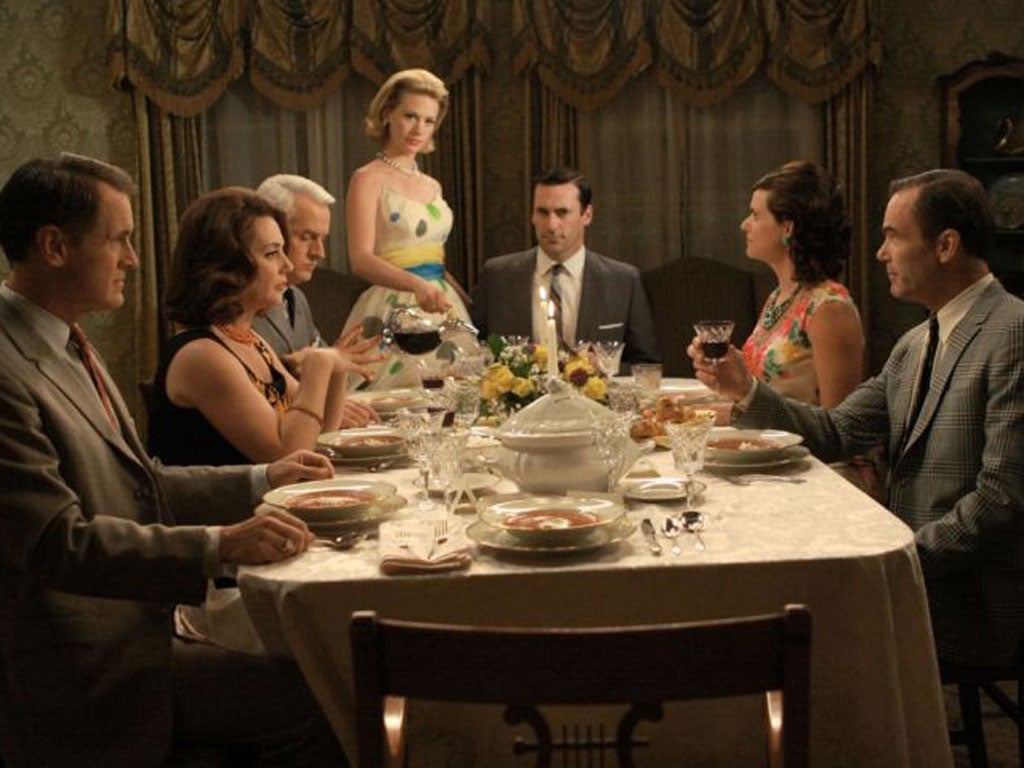David Lister: Mad Men's lesson for British TV drama – viewers get the era without a sledgehammer
The Week In Arts

In the television drama series White Heat, the house of Sixties students and young wage earners are very selective TV watchers. When the television in the house is on, it is showing the Vietnam War or Harold Wilson's devaluation speech, or a demo or a news bulletin. What a serious bunch, so commendably committed to current affairs. They never settled down on the sofa with a beer and chuckled at The Likely Lads, or tested their wits against University Challenge.
The advertising men and women in Mad Men watch a lot less television. They watch hardly any, in fact. Yet the series still makes you aware that somewhere in the backdrop to their lives, mentioned between more pressing affairs or just affairs at the water cooler, there has been a Cuban missile crisis, a president has been assassinated, Marilyn Monroe has died and The Beatles played Shea Stadium.
In a strange way, that difference of approach is why I am looking forward to the return of Mad Men next Tuesday more than I am to the next episode of White Heat. And, on a broader level, it is why American drama gets it right where we get it wrong.
Mad Men evokes the Sixties so well, not by having news bulletins constantly playing on an office TV, not even solely by its brilliant art direction, clothing, furniture and the rest, but by the way the characters treat each other, show the attitudes and stereotypes of the time, the casual misogyny, the unthinking racism certainly, but more in the way the era is in their bloodstream.
The writers do not take the British television drama way of hitting you over the head with current affairs and making the characters (usually a convenient cross-section of period stereotypes) fit into that framework. The Americans give you a character-led drama. It is Don Draper's life, his struggle with his identity, his marriage break-up that carry the story. The era is the backdrop to his life, never the other way round. Tickets for The Beatles at Shea Stadium are a way of getting in with his young daughter, then never mentioned again. They are not an excuse for a bit of convenient archive footage.
The intrigue, affairs, sexism and jockeying for position of office life (why, by the way, can't Britain, with the exception of The Office, make good and regular dramas about office life?) helps to make Mad Men as compelling as it is. The era seeps through in every conversation, every outfit, every cigarette, every piece of office furniture, every grope of a secretary. Yet the era is never thrust in your face.
Somewhere along the line, British television has fallen behind its American counterpart in the most basic rule of drama. It's all about the characters and plot. Don't make the period the star of the show. Have compelling characters and you will smell the era without even realising it.
Patience pays off at the RSC
Congratulations to Gregory Doran, who has been appointed the next artistic director of the Royal Shakespeare Company. Doran, the partner of the actor Antony Sher, is one of the country's finest directors of Shakespeare, and knows the RSC inside out, having spent most of his working life there.
What is surprising, and rather endearing, about the appointment is that Doran applied for the job 10 years ago when it was last advertised, and didn't get it. In most British companies, if you are turned down for the top job, you tend to seek your fortune elsewhere. At the RSC, stay put, keep your eye on the prize, and your chance will come again.
The only Shakespearean comparisons that come to mind are Macbeth and Richard the Third, which are hardly fair on Greg, who is an estimable figure. I prefer to think that he is a role model for those who refuse to take no for an answer.
Take pride in being bohemian
The Home Office has apologised to the actors' union Equity after one of the union's members was told he couldn't be a passport counter-signatory as "acting wasn't a proper job". West End actor Michael Sheldon had provided a reference on a passport application for his daughter's boyfriend. But the application was rejected by the passport office because it said it did not regard an actor as an acceptable referee.
This was offensive, inappropriate and inaccurate, the Home Office now concedes. And the matter has been raised in Parliament. But I think Mr Sheldon and Equity should have been secretly pleased at the rebuke. Isn't there something rather roguish and attractive about acting still being seen, as it was a few centuries ago, as a disreputable and slightly scandalous profession? And, for what it's worth, I've never thought that journalism is a proper job.
Subscribe to Independent Premium to bookmark this article
Want to bookmark your favourite articles and stories to read or reference later? Start your Independent Premium subscription today.

Join our commenting forum
Join thought-provoking conversations, follow other Independent readers and see their replies